Juro offers a clean, all-in-one platform for managing contracts, but just like any other tool, it doesn’t work for everyone.
Maybe you need stronger integrations. Maybe your workflows are more complex. Or maybe you're scaling fast and need tools that grow with you.
Whatever the reason, the good news is that there are plenty of options. From AI-powered platforms like Aline to straightforward solutions like ContractWorks, this guide covers the best Juro alternatives available right now.
We’ll walk you through what Juro does, why some teams start looking elsewhere, and which tools are worth considering based on your size, needs, and goals. If you’re serious about improving how your team handles contracts, you’ll find something here that fits.
Juro is a browser-based contract management tool. It’s designed to help legal professionals and business teams draft, approve, sign, and store contracts in a single platform. Rather than managing several different tools, you do everything inside Juro.
Essentially, Juro gives you a built-in contract editor that works like a stripped-down word processor, plus templates and a clause library to help speed things up.
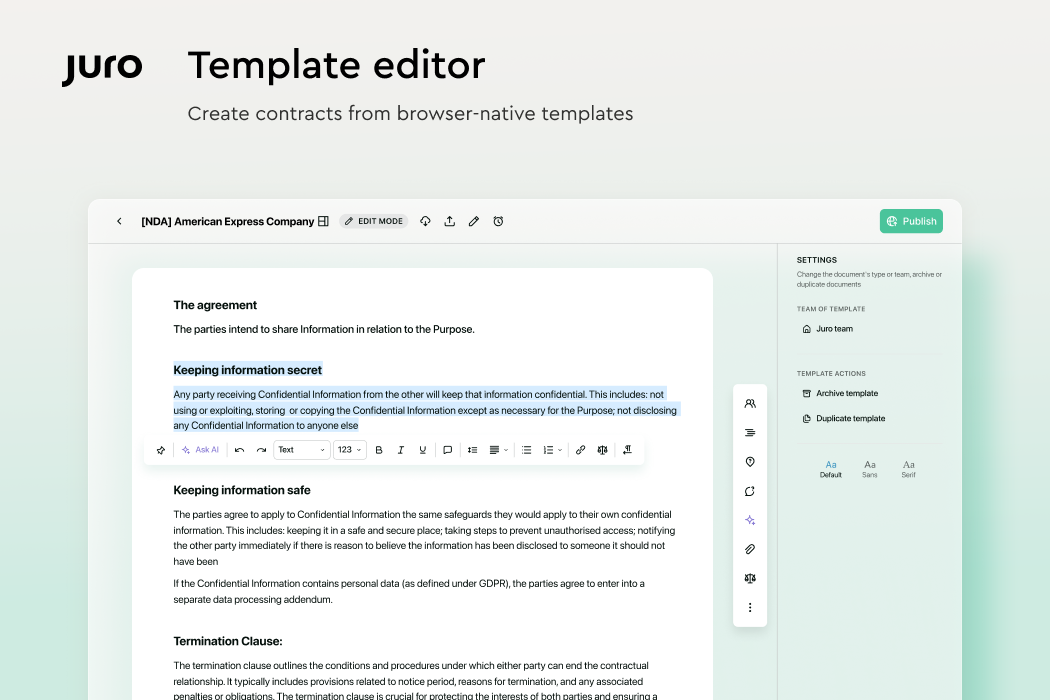
It also lets you build approval workflows, so the right people can review documents before anything gets signed. Plus, signatures happen inside the platform, which means no extra tools are needed.
Real-time collaboration is another key feature. You can leave comments, track edits, and see what’s been changed. Once a contract is signed, it’s stored in a searchable contract repository with a full audit trail.
Despite all these good features, it’s not perfect for everyone. Some might find it limited when it comes to integrations, reporting, or customization. And if your process needs more flexibility or you’re dealing with higher contract volume, Juro might start to feel a bit tight.
Juro does a solid job for many businesses, especially if you want everything under one roof. But depending on your setup, team size, or how your contract management processes work, you might find another platform that suits you better.
Here are a few reasons people start looking at alternatives:
It’s not that Juro doesn’t work; it just might not match your current or future needs. That’s when exploring other contract management software makes sense. So, where do you start looking?
If Juro doesn’t fully match your needs, don't worry. There are plenty of other tools out there that help manage contracts more efficiently.
Aline is an AI-powered contract lifecycle management (CLM) platform that combines smart automation, clean workflows, and some of the most advanced legal AI available today.

What makes Aline stand out is how fully the platform supports every step of the contract lifecycle. You’re not handling separate tools or half-connected features because everything runs in one place.
Aline AI helps you draft full agreements, produce precise redlines, analyze terms, and surface key issues, long before they slow your deals down.
The platform also brings real structure to high-volume teams. Aline Associate can search across your entire repository and trusted legal sources to answer questions or support deeper review. Meanwhile, AI Workflows route intake, approvals, and negotiations with clear visibility.
AlineSign adds built-in electronic signatures, so contracts move from draft to execution without breaking the flow. And with the AI Repository auto-ingesting documents and pulling out metadata instantly, you can organize and report on thousands of agreements with AI auto-tagging.
Plus, Aline’s advanced features make it easier for legal, sales, procurement, finance, and operations to stay aligned. Playbooks apply your preferred positions automatically. Finally, AI Contract Reporting turns unstructured contract text into actionable insights in seconds.
DocuSign CLM is a contract management tool for people who need structure, automation, and control throughout the entire contract process. It allows legal teams and business users to manage everything from drafting to approvals to signing.
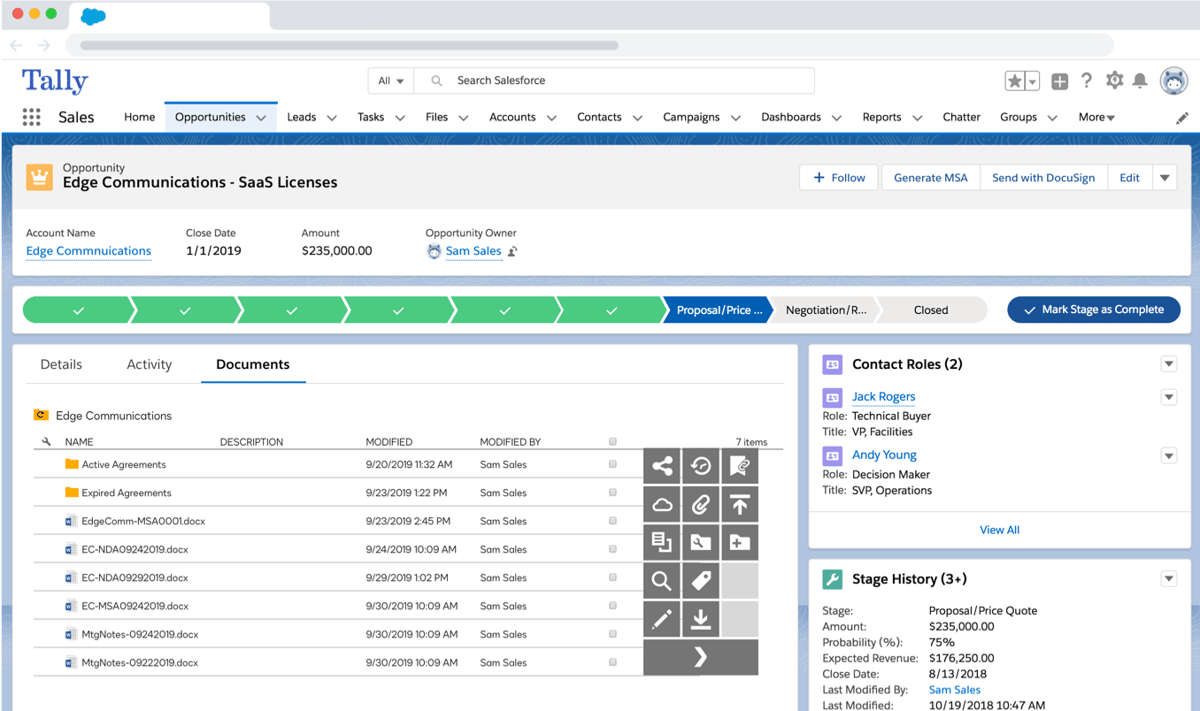
If you already use DocuSign to sign contracts, CLM adds full contract lifecycle support to keep everything sorted and moving.
Plus, compared to tools like Adobe Sign, which mainly focus on the signing process, CLM supports more detailed workflows, clause management, and audit tracking.
ContractWorks is a straightforward contract management solution focused on helping users organize, sign, and track agreements. It’s a solid pick for businesses that don’t need a ton of extras but still want to streamline contract management and keep things in order.
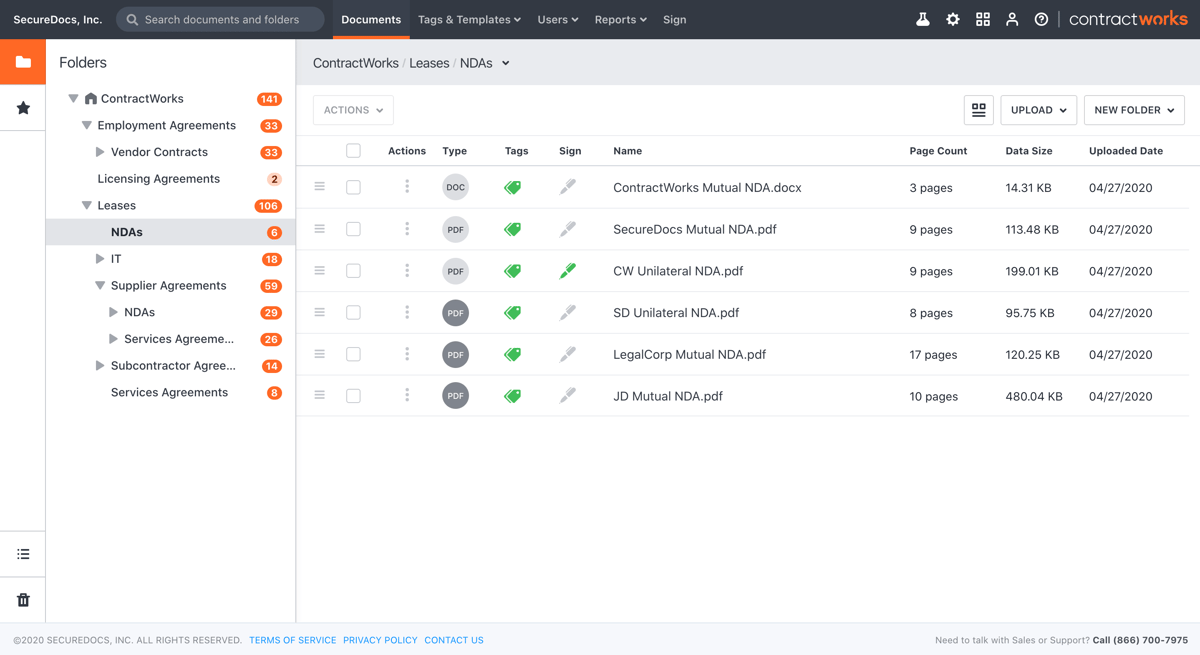
It works especially well for managing legacy contracts and keeping key documents in one central place. It’s often used by smaller legal teams or operations managers who just want to get contracts in and out efficiently.
PandaDoc is a cloud-based platform that lets you create, send, and monitor business documents. These include contracts, quotes, proposals, and more.
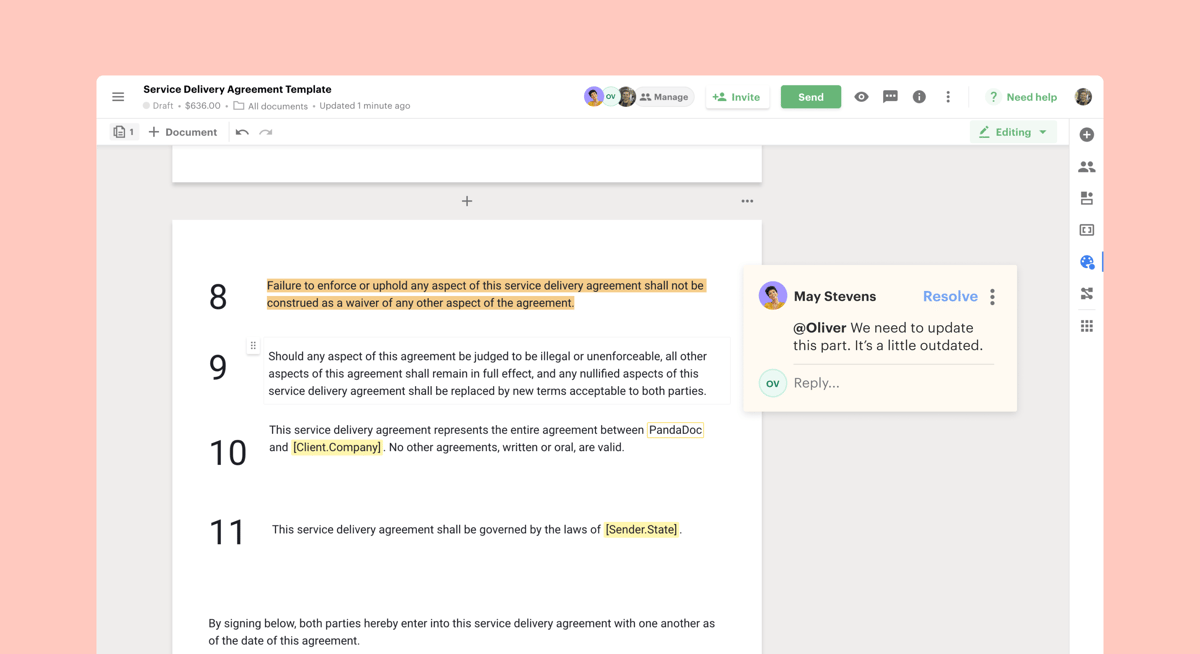
This web-based platform is designed for speed and simplicity, which makes it a popular choice among sales, marketing, and operations. It focuses on contract generation, approvals, and eSignatures, all through a user-friendly interface.
Unlike other popular platforms that are more legal-heavy, PandaDoc leans toward users who want to move fast and keep things looking polished.
It’s a good option for businesses exploring alternatives to manage documents without the need for legal teams to get involved in every step.
Concord is another contract management platform that allows you to create, collaborate on, and manage contracts from start to finish. Its design makes it a good choice for businesses that want a comprehensive solution without a steep learning curve.
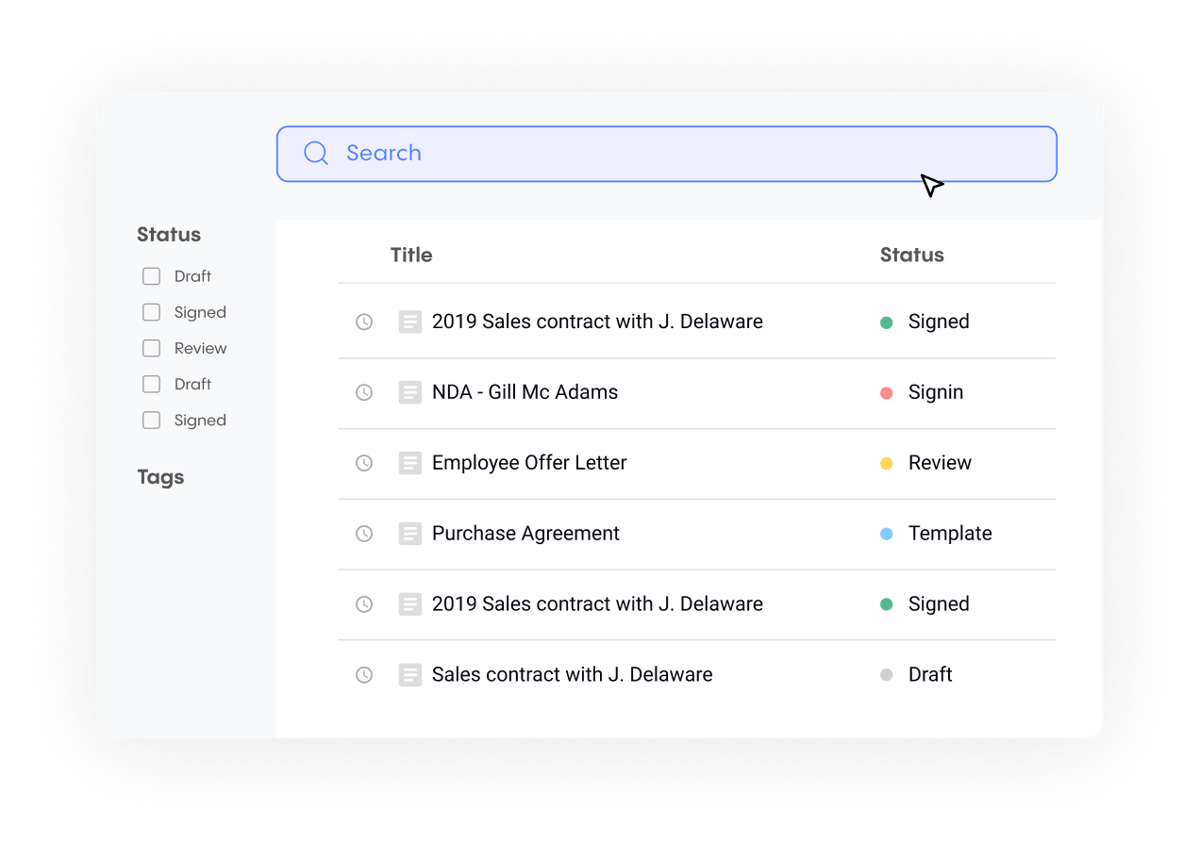
Concord supports everything from contract drafting to eSignatures and offers features that help various departments stay on the same page.
One of its strengths is how accessible it is. Concord focuses on user adoption with a clean interface and easy onboarding.
Zoho Contracts is part of the larger Zoho suite, created to help companies manage the full contract lifecycle within a unified workspace. It’s especially useful for teams that already use other Zoho apps like Zoho Sign, but it also works well on its own.
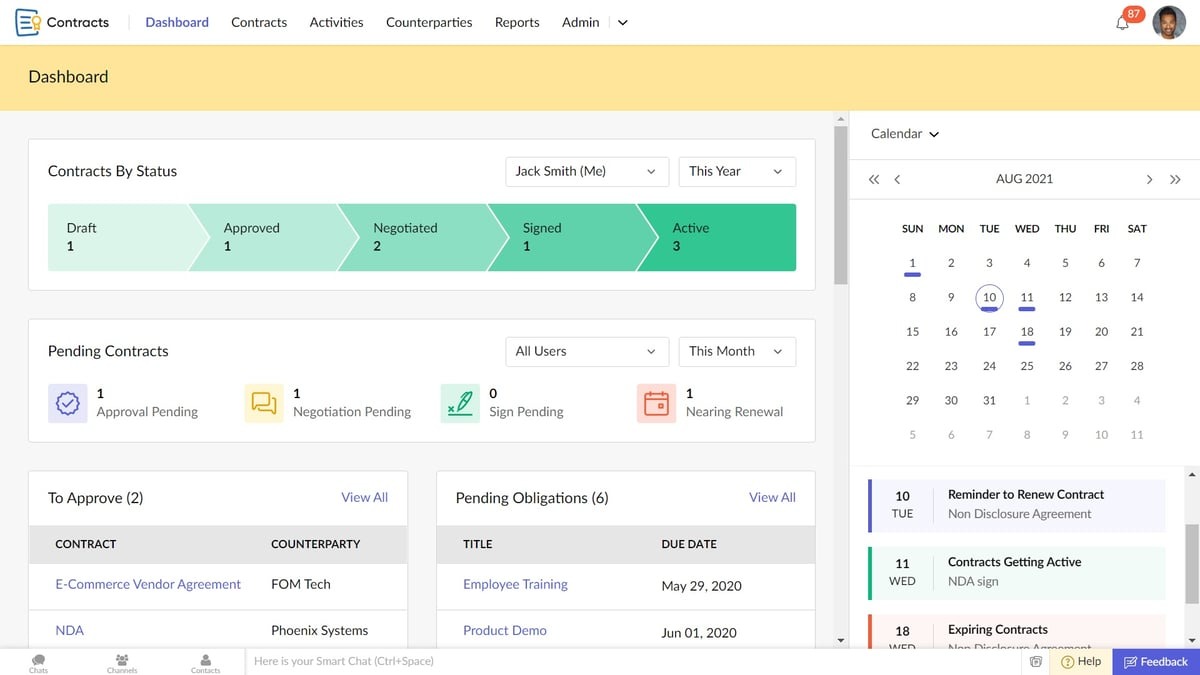
The platform combines robust features like drafting, approvals, eSignatures, and renewals to help with better organization and contract risk management.
With a centralized repository, customizable templates, and easy integration with key business systems, Zoho Contracts gives users the right tools to handle contracts without switching between platforms.
ContractPodAi is a legal-focused contract management platform that supports the full contract lifecycle. It’s often chosen by in-house legal teams looking for their first CLM that balances automation with control.

The platform brings together contract creation, negotiation, approvals, and e-signing into one unified workspace. It’s flexible enough to support different document formats, including full integration with Microsoft Word, so legal teams can work in the environment they’re used to.
Compared to other alternatives, ContractPodAi stands out with its legal AI tools and guided workflows. These features can help users meet specific needs around compliance, risk, and document management.
Aavenir Contractflow is a contract lifecycle management solution built on the ServiceNow platform. If your company already uses ServiceNow, Aavenir Contractflow fits right into that environment.

For businesses with specific requirements around compliance, data visibility, and role-based access, Aavenir offers the kind of structure that simpler tools may lack.
This platform supports everything from intake to renewal tracking, with automation and reporting built in.
Malbek CLM is a contract lifecycle management platform that helps you handle contracts with clear workflows, search tools, and tracking woven into it.

Thanks to features like custom dashboards, clause libraries, and smart search tools, Malbek gives businesses the structure they need while keeping things easy to use.
It’s a suitable fit for companies that want better access to contract data, coordinated workflows, and support for collaboration across departments.
Hyperstart CLM is a contract management platform made for startups and small teams that want to handle contracts quickly and without extra layers. It covers drafting, approvals, signatures, and tracking all in a clean, straightforward setup.
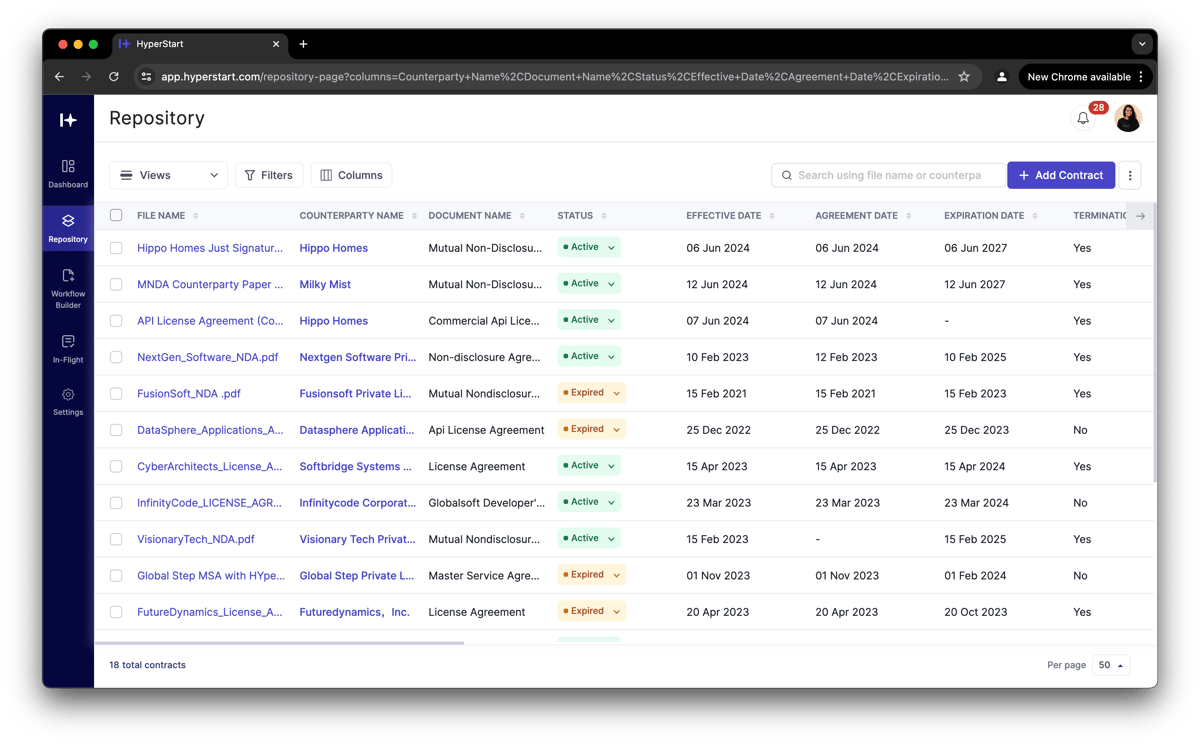
The platform focuses on keeping things simple while still offering useful tools like role-based access, audit logs, and automated workflows.
For teams without dedicated legal staff or complex review processes, Hyperstart CLM offers just the right level of structure to keep things moving.
Agiloft is a contract lifecycle management platform suitable for large enterprises with complex needs. It offers a wide range of features for drafting, negotiation, approvals, storage, and reporting. You also get a system that can be fully customized to match internal processes.
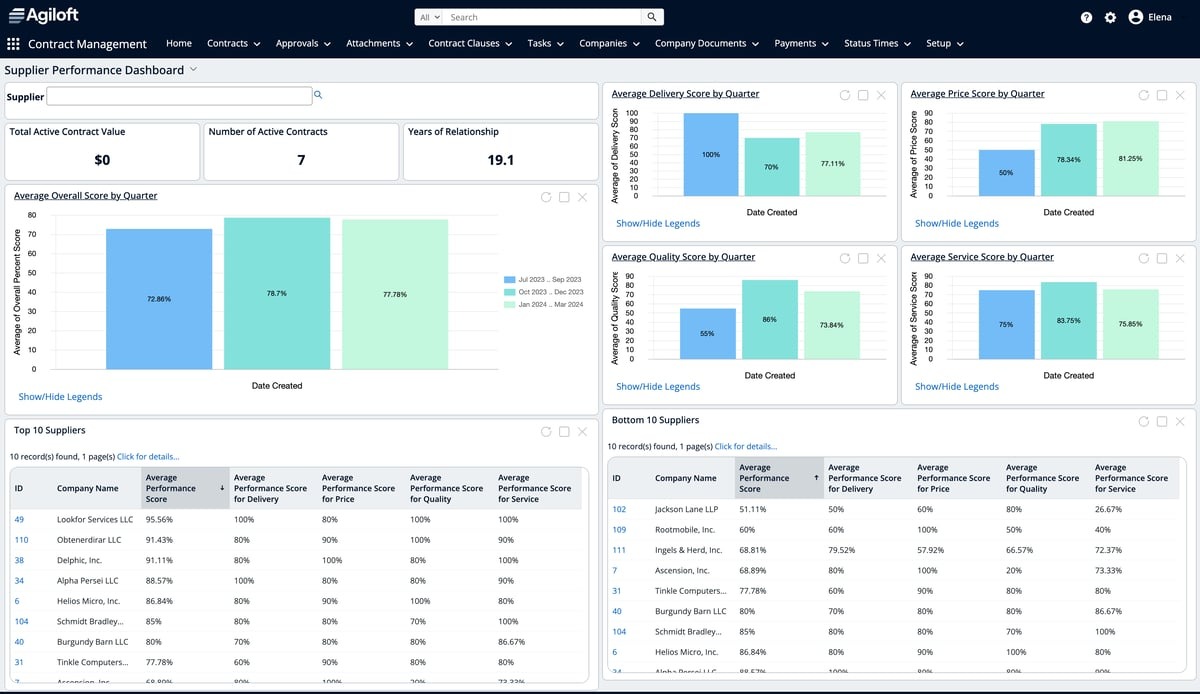
Many companies choose Agiloft when they need a platform that can adapt to their structure, not the other way around. Known for its flexibility, Agiloft allows organizations to build detailed workflows, set custom rules, and connect contracts to other business systems.
While the implementation process can take time due to the level of customization, it pays off if you want full control over how contracts are handled across departments.
There’s no shortage of tools to help you manage contracts, but finding the one that actually fits your team’s pace, structure, and goals is the real challenge.
While each of the platforms listed here offers something valuable, Aline brings it all together in one clear and efficient system.

With fast AI-driven drafting, powerful contract redlining, unlimited eSignatures, and an AI Repository that keeps every agreement organized and searchable, Aline gives your team a smoother, more predictable contract process from day one.
You get drafting support that feels immediate, negotiation tools that scale with your workload, and advanced reporting that turns complex agreements into clear data points your team can act on.
It’s a single CLM software tool that reduces friction for legal while giving departments like sales, procurement, finance, and operations the clarity they need to keep deals moving.
Want to achieve the same results for your team?
Try Aline today and see what a game-changer it can be for your contract process.
DocuSign centers on electronic signatures, while Juro combines drafting, collaboration, approvals, and e-signing so teams can manage the full contract workflow in one place.
Yes. Many legal and business teams use it for structured workflows, though some users look for alternatives that offer broader integrations or more flexibility.
Adobe Sign is frequently viewed as DocuSign’s closest competitor, with Dropbox Sign also appealing to teams that want a simpler e-signature tool.
Most top Juro alternatives offer templates, clause libraries, and flexible editors that make contract creation faster. Many also let you import legacy contracts, so your entire library follows the same structure.
Yes. Several platforms offer budget-friendly plans with key features like e-signatures, approvals, and tracking important dates. Dropbox Sign is a common pick for teams that only need core functionality.
They do. Many offer deeper customization across workflows, fields, review steps, and integrations, which helps teams adapt the platform to their exact process and get more from the features offered.

